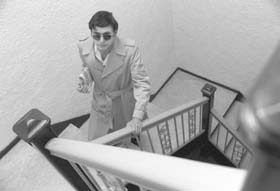
| ||
 | ||
 Economics professor Tom Naylor PHOTO: OWEN EGAN |
On the trail of filthy lucre: Economist studies tax evaders, cheats and crooks
|
TOD HOFFMAN | The underground economy is so deeply entrenched that it is, in essence, a structural feature of the mainstream economy. And there's nothing particularly new about this phenomenon according to economics professor Tom Naylor, who's been teaching and studying the problem for more than a decade.
"The history of capital accumulation is the history of greed, theft and brigandage," he argues. Naylor's undergraduate course on the origins and operation of the underground economy is one of his department's most popular offerings; the class has been singled out in Maclean's annual survey of Canadian universities as one of McGill's "hottest." According to many of the course evaluations that have been submitted over the years, the relevance of the subject is among its major attractions. Certainly, that's what drew Naylor to it. "I look for subjects that are useful to society and the number one financial threat today is the evasion of taxes, because without revenue there is no government," he says. "A culture of evasion has come into being. It's a problem with social and ideological, as well as economic, implications. There have always been people who've tried to cheat, but it's only recently become something they openly boast about." The issue is multi-faceted and, argues Naylor, extends far beyond drug trafficking, gunrunning or organized crime. The real danger stems from the evasive activities of the legitimate corporate sector. It's the Fortune 500 types who have the power and the accounting skills to cache significant wealth in off-shore tax havens, out of sight of federal or provincial revenue enforcement. Naylor positively shrinks from applying a number to the problem. "All the numbers are imaginary. Besides, my interest is in how the rackets work, not in determining their scope." The consensus, however, is that the scope is massive, some going so far as to estimate that it involves tens of billions of dollars. What spurs the underground economy? Greed, primarily, says Naylor. That along with a break-down in social cohesion, which fosters the attitude expressed famously by Gordon Gekko in the film Wall Street: "Greed is good." Without a sense of collective responsibility for society, there is no moral impediment to the crime of hiding revenues from taxation or, more bluntly put, defrauding the government. Furthermore, there is remarkably little fear of being caught. The Canadian tax system is based upon of voluntary disclosure of earnings. Money hoarded in trusts or under corporations registered in tax havens like the Cayman or Cook Islands, Switzerland or Liechtenstein can't be traced due to local banking secrecy laws. Even when Revenue Canada does uncover tax evasion, there is almost never a criminal penalty, only a fine that invariably amounts to considerably less than the accrued tax savings. Naylor's research shows that we are not in the midst of a genuine tax revolt, contrary to what some on the right wing would suggest. In fact, it isn't the rate of taxation that people resent so much as government mismanagement. Indeed, survey data indicates that people are willing to pay taxes when they feel government spending is serving their needs. Students of "The Underground Economy" are afforded insights into the whole gamut of nefarious financial transactions, from money laundering to maritime fraud, diamond and gold smuggling to currency counterfeiting. It's terrain that Naylor is quite familiar with. He co-authored a report on money laundering by drug criminals for a recent United Nations conference on illegal drugs. The report named 48 countries as "major havens" for drug traders looking to set up secret bank accounts. Addressing the UN conference, Naylor warned that the international "war on drugs" by governments poses its own risks to the civil rights of citizens. In some countries, suspected drug traders have had their assets stripped away before they've been tried for their alleged crimes. "There are horrible cases of [rights abuses] in the U.S., real abominations," Naylor told The Toronto Star. "You can't seize their money and their property and trample their civil rights and call them drug criminals without proving it. It's utterly Orwellian." Back at McGill, Naylor encourages his students to view the world through the eyes of someone looking to skirt the law. Among the course work he assigns is an essay posed in the form of a hypothetical situation that all too closely mirrors reality. For example, playing the role of a depanneur owner, they must develop a step-by-step strategy by which they would purchase, stock and distribute smuggled cigarettes and alcohol -- without getting caught. Another calls upon them to puzzle their way through a scheme to effectively launder earnings while preserving the appearance of being a legitimate businessperson. And yet another has students working out a process whereby Pogo-Pogo's Director of the Central Interference Agency can manoeuvre money undetected into the United States to pay their network of spies. Commercial crime is too often and mistakenly dismissed because it lacks the immediacy of predatory street crime. However, its insidious nature makes its cumulative impact even more severe. While the cultural mores that make tax cheating almost socially acceptable will die hard, Naylor argues that many of the tools are already in place to effectively tighten the system. If a sense of wrong can't be instilled, the penalties can certainly be stiffened so that the element of fear is restored. That can be accomplished by more diligent enforcement of existing tax laws and sanctions that lessen the reward-to-risk ratio. If honesty can't be compelled, says Naylor, at least compliance can be.
|
|
| |||||